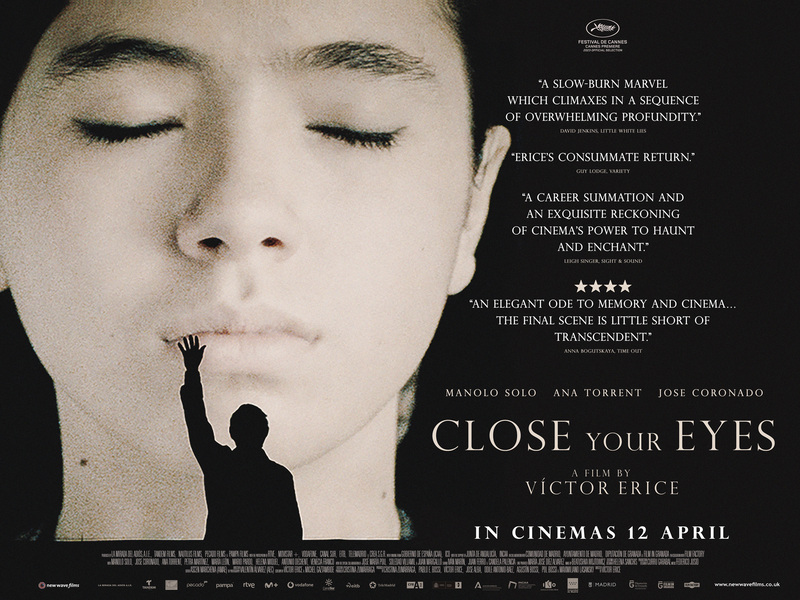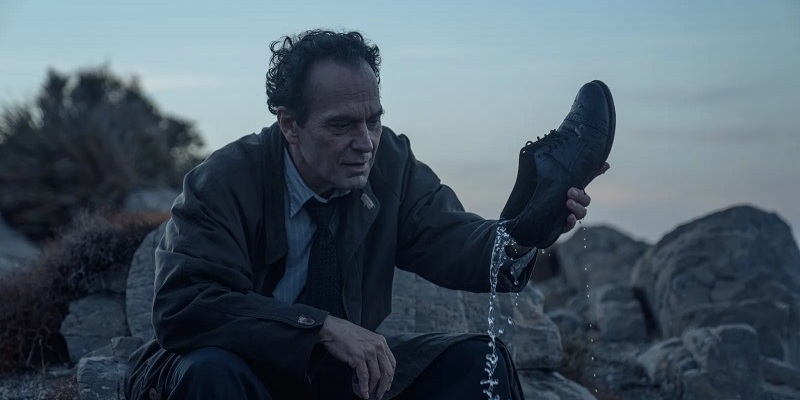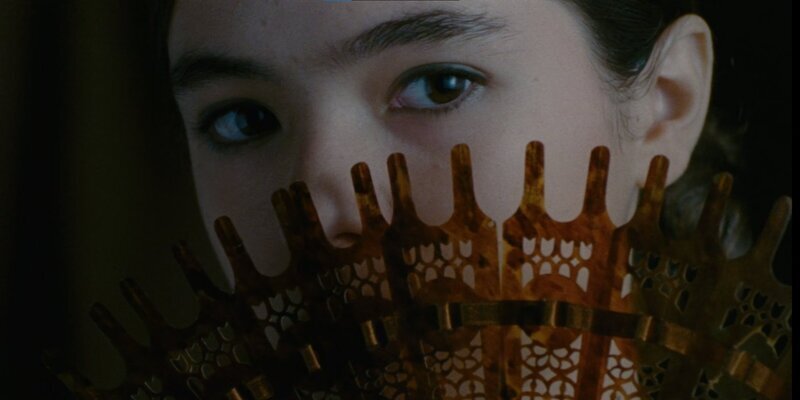
Review by
Eric Hillis
Directed by: Victor Erice
Starring: Manolo Solo, José Coronado, Ana Torrent, Mario Pardo, Soledad Villamil

One of the most influential films to ever emerge from Spain,
Victor Erice's 1973 debut
The Spirit of the Beehive is about a young girl who
retreats into a world of cinema to escape the trauma of life in post
civil war Spain. Erice's latest, Close Your Eyes, only his fourth film in his 50 year career, is about an old man who
has retreated from cinema. Having not made a film since 1992's
The Quince Tree Sun, it was fair to surmise Erice had himself retreated from filmmaking.
Yet here he is in his eighties, delivering what feels like a perfect
bookend to a career that began with a child discovering the power of
cinema and now might end with an old man rediscovering its
importance.
Like Erice himself, Close Your Eyes' aging protagonist, Miguel (Manolo Solo), hasn't worked in the
medium since the early '90s. He decided to pack it in when the lead
actor of his final film, Julio (José Coronado), disappeared
without a trace, having only shot two scenes – the film's opening and
climax. Julio wasn't simply Miguel's leading man, but a longtime friend
with whom he served in the navy and even spent time in prison with due
to their anti-Franco sentiments. Julio's disappearance has clearly had a
profound impact on Miguel, who has spent the subsequent years living in
a trailer on a beach like the hero of a 1970s detective show.

In 2012 Miguel is contacted by the producers of a tacky tabloid TV show
in the vein of Unsolved Mysteries. They wish to run an episode on the mystery of Julio's disappearance.
Initially reluctant to cooperate, Miguel's financial situation forces
him to agree to take part. His own interest in solving the mystery is
piqued. He looks through old artifacts he had long hidden away and gets
in touch with his former editor Max (Mario Pardo), now an
archivist in possession of the footage of Julio's final screen
appearance.
This footage brackets the film and is shot in 16mm film, in stark
contrast to the flat digital look of the 2012 sequences. This gives the
footage a special, almost magical quality, and when it's projected on
the screen of a derelict cinema in Close Your Eyes' moving finale, its livid grain makes us believe we're in that same
auditorium.

As Max launches his own investigation into the whereabouts of Julio, he
revisits the past and is reminded of all he left behind when he walked
away from cinema. There's a melancholy notion pervading the narrative
that the art form Miguel and Max devoted their lives to is becoming
increasingly irrelevant, consigned to steel cans in dusty archives,
tended to by old men until they pass and it's left to expire like the
contents of a dead bachelor's fridge. When Max is called upon to operate
a cinema projector that hasn't been used in decades, his face lights up
with the thrill of an old man who is suddenly relevant once more, and I
thought of all those stories of retired projectionists who were recently
called upon to assist puzzled cinema owners in screening Christopher
Nolan's
Oppenheimer
on 70mm. We're told the same projector was once used to view the dailies
of the many spaghetti westerns that were filmed in the region in the
'60s and '70s, and I was reminded of the joy of seeing my (terrible)
film school graduation film projected on the big screen of the Irish
Film Institute, the same screen where I had seen some of my favourite
movies. Not since Tim Burton's Ed Wood has a film captured
what it feels like to be a filmmaker seeing your work projected,
regardless of its quality.
Close Your Eyes isn't simply about the power of cinema to
hold memories, but of art in general. There are three singalong
sequences in which the songs are explicitly linked with nostalgic
memories. Some of the memories are welcomed, like a heartwarming
rendition of 'My Rifle, My Pony and Me' from Howard Hawks' classic
western Rio Bravo. Others bring back memories that parties would prefer left alone. When
Miguel visits an old unrequited flame (Soledad Villamil) and asks
her to sing a song he once loved, she cuts the ditty short when she
realises the significance of its sad lyrics. The way Villamil closes the
lid of her piano is heartbreaking, suggesting she may never be able to
open it again.

Lids are opened and closed throughout Close Your Eyes as
Miguel unlocks the past. It reinforces the importance of physical
artifacts, and forces us to contemplate how dull a movie Close Your Eyes would
be if Miguel could simply sit in front of a laptop and conduct his
investigation with a few mouse clicks. In Coronado's remarkable
transformation from Julio's fifty-something self as seen in Miguel's
footage to the rickety septuagenarian we later come across, we're
reminded that no amount of digital aging effects can compete with an
actor committed to exploring their mortality. The contrast between the
two Julios is astonishing, but it's all done with physical performance
and a splash of hair dye.
For anyone who loves cinema and fears for its future,
Close Your Eyes is a highly emotional experience. It's a
cousin of
Top Gun: Maverick
and
Nope
in how its rousing finale sees vintage technology dusted down to serve a
vital purpose. In Miguel and Max we get two old guys on one last mission
to save the world (or at least one man) with reels of celluloid and
beams of light. If it is indeed Erice's final film, it's a fitting
farewell gesture. There's something deeply moving in how he casts
Ana Torrent, the young star of
The Spirit of the Beehive, in a key role. As we watch those big brown eyes dazzled once again,
50 years later, by the flickering magic of a moving image, we're
reassured that while it may now have a few wrinkles, cinema is as vital
as ever.

Close Your Eyes is on UK/ROI VOD now.

